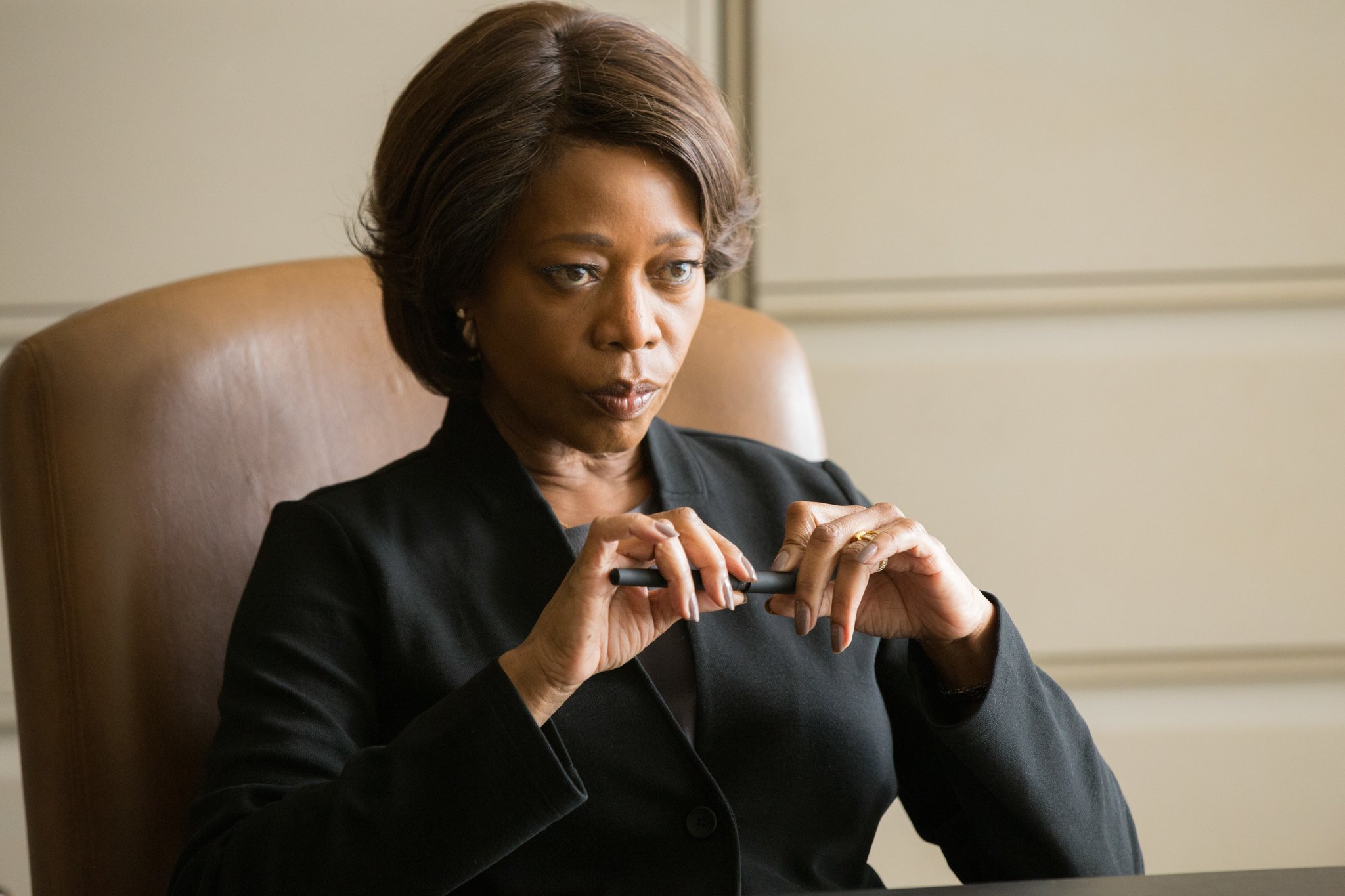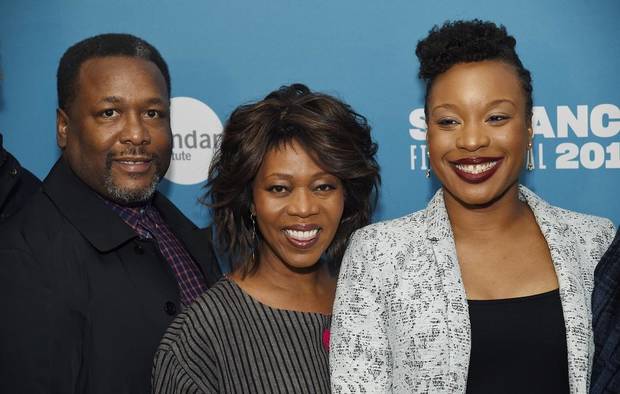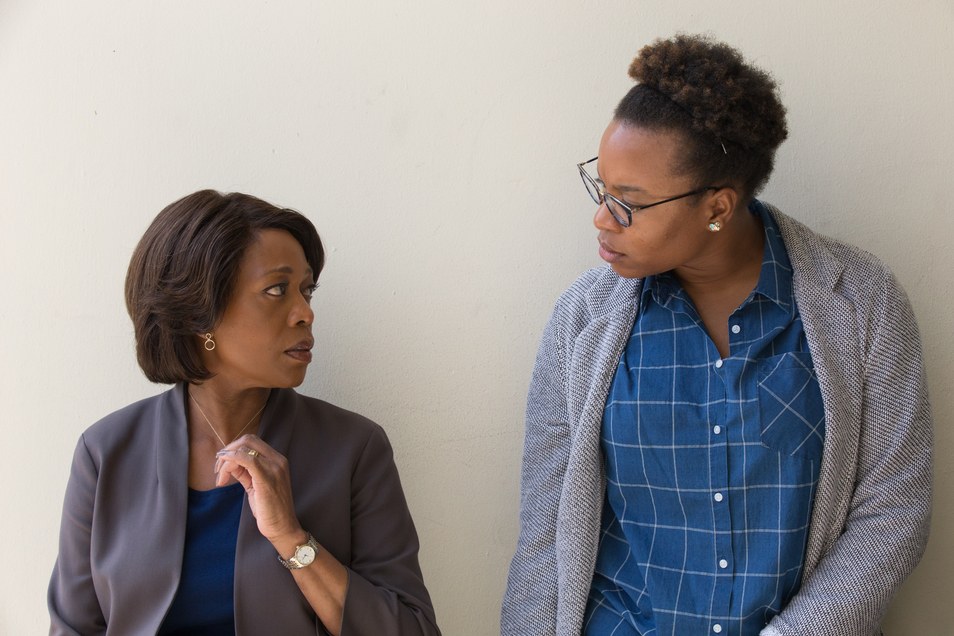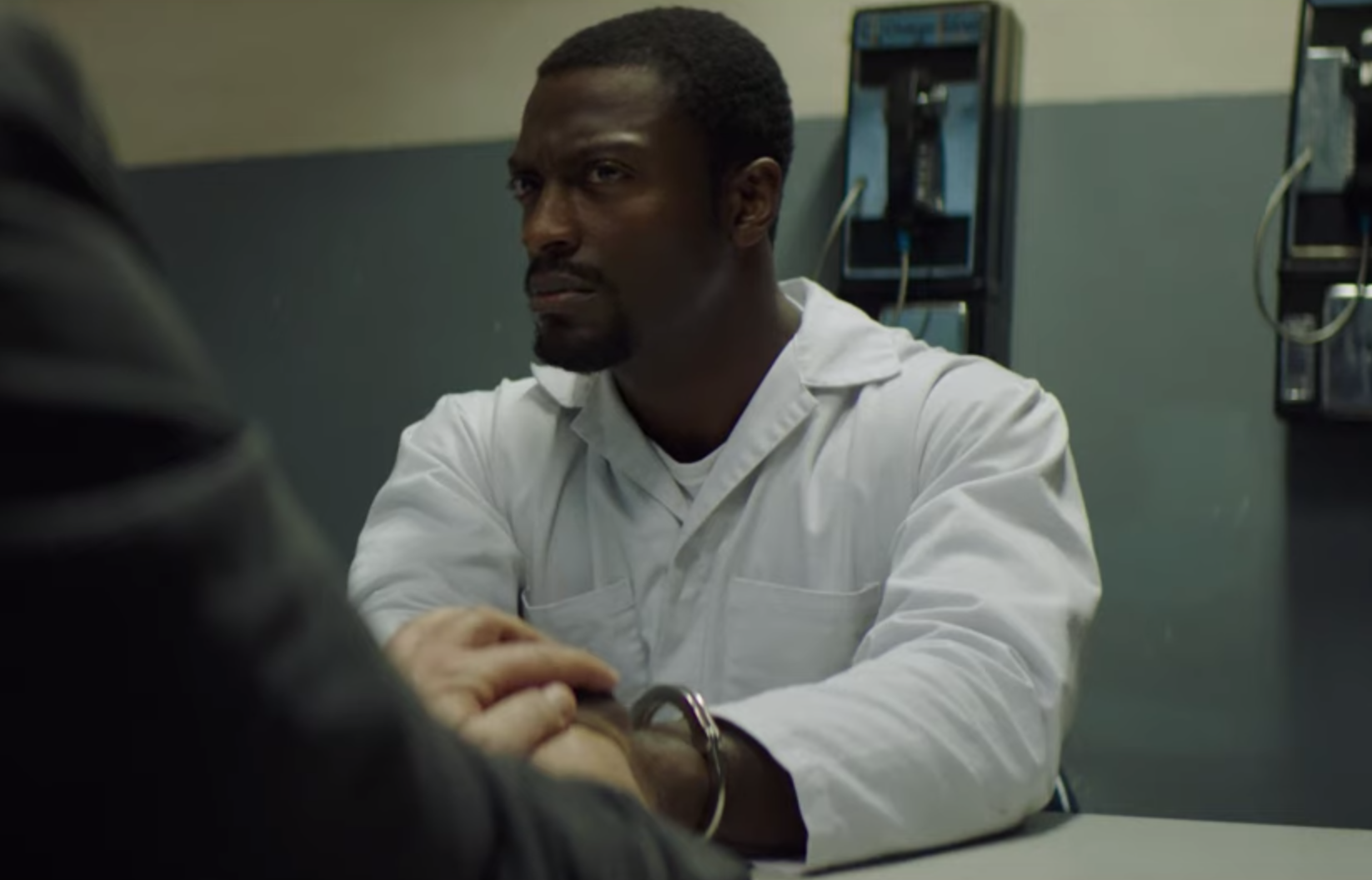Interview: Chinonye Chukwu on 'Clemency' and Alfre Woodard's astounding close-ups
 Thursday, December 26, 2019 at 5:10PM
Thursday, December 26, 2019 at 5:10PM 
Anchored by a staggering performance from Alfre Woodard, Clemency is a powerful, precise and scorching indictment of capital punishment. We follow Woodard as prison warden Bernadine Williams, as she prepares to execute another inmate (Aldis Hodge), and deal with the toll, years of carrying out death row executions have taken on her life and relationships.
Director Chinonye Chukwu won the Grand Jury Prize at the Sundance Film Festival last January. She started working on the film after Troy Davis was executed in a Georgia State prison in 2011, when “the sounds of the hundreds of thousands who protested against his execution kept ringing in my ears, and I couldn’t help but wonder: if so many of us struggled with what had happened to Mr. Davis, what about the people who actually had to carry out his execution? What if some of them were also grappling with having to kill this man?”
We recently met with Chukwu in New York. [This interview has been edited and condensed for clarity.]
Murtada Elfadl: Congratulations on the film. You start your movie with an execution, you end it with an execution. So it's these two bookends. That was a bold, strong choice. Can you talk about why you made that choice?
Chinonye Chukwu: I did that for a couple of reasons. One, to show Bernadine's arc and that she's not in the same place at the end as she was at the beginning of the story. Also, I wanted to get at the cyclicalness of the space of a prison that with or without her, this cycle of capital punishment is going to go on.
This film is very performance driven. Did you write it with Alfre Woodard in mind?
No. I mean I wasn't really thinking about anyone particularly. Screenwriting and directing are two separate art forms to me. And so I consider myself a screenwriter as much as I do a director. And so when I'm writing, I'm really thinking about the story. And then once I get the script to a place where, okay, I'm ready to start sending this out. Let me put my director hat on and think about casting. But I was really thinking about the story then.
I'm just so taken with Alfre in this film I think is the performance of the year. She's so amazing.
Yes she's phenomenal.
 Wendell Pierce, Woodard and Chukwu at Sundance
Wendell Pierce, Woodard and Chukwu at Sundance
When I first saw the movie, I was so taken by all the closeups on her face. There are so many of them. That's why I asked you if you wrote it with Alfre in mind. Because there are very few actors who can do that. Tell me about why you made the choice to do so much in closeup. Was that always in the script? Was that because Alfre was cast?
Once I started thinking about this film, I knew in my director's mind that we were going to have a lot of faces in it because I want you to see these people. I want you to stick with them and stay with them as their humanity evolves in real time. So I knew that I needed to cast people who can tell a story with their eyes. And Alfre Woodard is one of our greatest actors. How many actors do you know who can hold a four minute close up? And Aldis too. I mean the scene where Bernadine is telling him the protocol. I knew that I wanted something like that, but they both just took it to a whole other level once we started working together.
Did you guys rehearse? It's such a performance driven movie. It's so intimate and it shows their strength as actors but also you working with them is why people are affected by this movie.
Alfre and I spent a couple months before shooting together and we would meet regularly, like almost every week or every two weeks. We would just talk, we talked about every scene in the script, the beats and the emotional arcs of her character moment to moment to moment. And we also took a trip to Ohio together where we talked with several wardens and talked with two men on death row and with other men and women who are incarcerated. And I think all of that really informed the work that she did in the film. And with Aldis I sent him books and articles to read. He also spent a day in San Quintin and talked to a lot of men who were incarcerated. And I also met with him early as well before we started shooting.
Their performances are really amazing. This is a movie about the inner life of a woman and we don't see a lot of movies like that. So what were some of your inspirations? Did you have any cinematic inspirations other than the story of Troy Davis?
I did. So there were a lot of filmmakers who made films that inspire me. So the film Ida was a great inspiration by Paweł Pawlikowski. Bella Tar is one of my favorite filmmakers, he has a great film called Werckmeister Harmonies. You don't see this in the film, but Federico Fellini is one of my favorite filmmakers and I just love him. Michael Haneke is also a filmmaker whose films really inspired my choices. Steve McQueen's Hunger was another film that I thought about and was inspired by.
Let me ask you about your Sundance experience. So I was at that first screening at Sundance and saw the reaction to the film. And then you won the grand jury prize. It's been almost a year. The next Sundance is almost here. So can you talk about the experience, the importance of Sundance and winning that award?
Getting into Sundance is a platform in itself. Winning the grand jury prize gave my film a platform that it wouldn't have had unless it won. And so I'm very aware of that and really thankful for that. It really expanded the possibilities of my filmmaking career. And so this year has really been about leaning into those possibilities and opportunities.
What do you mean by that?
One of the projects that I have on my slate is 'A Taste of Power', an adaptation of Elaine Brown's memoir, the first and only female leader of the Black Panther Party. And so that was a project that I've always wanted to do for years. Getting into Sundance and let alone winning the grand jury prize has really helped me solidify that opportunity and to be a writer and director on 'A Taste of Power'. And other opportunities too.

Your movie is talked about for Alfre's performance in the context of awards. With the announcement of the Golden Globes yesterday we had this outcry when no movies directed by women were nominated. Do you have a comment on that specifically and just in general about being in the awards conversation?
I don't really have a comment. I mean it's one of those things where it's a potential platform that could help widen the reach of your film. Or not. Particularly for a smaller budgeted film like ours. But you can't define your joy and your worth by that.
Right.
I think that you feel the disappointment in it and you speak out and you fight for change. But you also have to live in your joy and continue making work and figure out how you're going to create the platform in other ways.
Yeah. I'm going to vote for Alfre in all my critics groups.
Whoa, yeah.
She's my number 1.
Please do. I mean don't get me wrong. I mean shit, nominate us, let us win. Shit. That's great, because it continues to get the film out there. But you know, that doesn't happen a lot of times and so what are we going to do about it?
You can't count on it.
But if it comes, let it come. (laughs)
One of the most beautiful scenes in the movie I think is the one with Danielle Brooks as Aldis's ex. It could be a short film of its own because as an actor, she came in and she told me the character's whole story so beautifully in those few minutes. You wrote and directed that, can you just expand on that scene and how you came up with it because it tells you a completely different story that's not entirely about the story in the movie, but also a beautiful story of its own.
That was one of our keys into Anthony's life and his personal life and his humanity and his softness. And he's been so hard out of survival for so long. And so that was the one thing that can soften him; the potential for a family that can extend his legacy beyond his death. And that was really important to him. Interestingly enough, it was this one of the scenes I wrote the fastest. It came to me so clearly emotionally and psychologically.
I knew what the arc of the scene was going to be from both perspectives. People have families and histories and lives beyond the prison walls. And it was important for me to show that. With Danielle's character it was important for me to once again show a self possessed woman who made choices that I think some people might not have liked, but she made them for herself. But I also wanted to show how other people who are tied to those who are physically incarcerated have also experienced that kind of mental or emotional incarceration. That there is an ecosystem of lives that are affected by capital punishment and by incarceration.

Another relationship in the movie that I love is the relationship between Alfie and Wendell Pierce as her husband. This other relationship that spans the whole movie but it is also so beautifully observed and very minimal. We don't get too much of them together, but we understand the relationship. Can you talk about writing that relationship and working with the actors on it?
Just like Danielle's character was a key into Anthony's personal life, Bernadine's marriage, her husband is a key into her personal life. It was important for us to see that. How what she does at work is affecting these other areas of her life. I knew that I wanted to portray a lived in relationship that had a foundation of love, but things are complicated right now and they're going through something right now, but there's still a baseline of love. That is much more interesting because it would be too easy if they just hated each other. And so I really enjoyed figuring out with Alfre and Wendell the textures of that relationship. I wrote a lot of it on the page, but they really brought in the layers and the nuance from within because they're a little bit, quite a bit older than me. Alfre's been married for over 40 years. Wendell has been in a very long term relationship and so they were able to bring in a lot from their personal experiences that I just don't have.
They're so beautiful together. Great chemistry. One last question. In this time that we're living in, some filmmakers feel responsibility to comment with their art about socioeconomic and political situations.This movie definitely has a message. Do you have any concerns about being labeled an agenda filmmaker?
No. I mean I don't think I'm an agenda filmmaker. I think I'm an artist and an artist's responsibility is to engage with the times that we're in, to be in conversation with our present moment. And you can do that in different ways and it can look like different things. It could look on the nose or it could be more subtle. It can look like portraying a Black woman as a human being. It can look like holding on a closeup on Brown skin, on an older Black woman's face and not letting go. I'm interested in telling stories. It could look like a romantic comedy, like a Western, like an animated children's movie. I don't consider that being an agenda filmmaker. I think that that's just being an artist.
Clemency opens Friday in limited release in LA and new York, it will expand into more cities in the New Year.



Reader Comments (9)
Clemency is an impressive achievement. At the end of the film, we are not faced with the ethical dilemma of supporting or opposing the concept of capital punishment. Rather, we are challenged to look closely at the effect the act of the government executing its citizens has on those employed to complete the distasteful task.
I love Clemency because it shows us the actual profession of a prison warden. Too often jobs are just peripheral information to add color to a character. Here the struggle and difficulty of a high pressure job is the centerpiece of the film. The long close ups on Alfre Woodard's face show us the physical effects of the job stress on this competent woman. Her eyes reveal the impact on her well being.
One of the many memorable moments from the film that nags at me is when the grandmother (Vernee Watson) of a condemned prisoner asks for an honest assessment of the man's chances of clemency. In a clipped professional tone, Warden Bernadine Williams warns of little hope. In profound grief, Mrs. Collins clutches the other woman in a tight clinch and weeps. The camera lingers on Woodard's face. In this wrenching moment, we see the complexity of compassion, professionalism, and discomfort wash across her face. Not for a moment do we doubt the truth Woodard presents. This aspect of criminal justice is not a profession many of us would seek or endure.
Mr. Elfadl is correct. This is one of the strongest performances of the year. We are privileged to see a remarkably gifted but criminally underutilized actress land a great role and present the portrait of a fully realized woman in work that rings with a refined intellect and deep emotional truths. Bravo Ms. Woodard!
I wish NEON had given this the campaign it deserved. We should be talking about the race between Renee and Alfre for all the Best Actress prizes.
The critics' groups could have all helped Woodard's cause. Too bad they didn't.
As usual there's a warmth to this piece from Murtada,when he likes something he really likes it,thanks,still not seen the film here in UK.
This was a great interview, I just wish I could see the film already! Alfre is one of our greatest working actors and it’s a shame that a performance as heralded as this one isn’t going to get the recognition it deserves (unless a miracle happens).
'Ready' gets it right. If NEON would've put a decent campaign together for Alfre, she'd be neck and neck with Renee right now. Alfre gave the performance, the distributor needs to do their part.
Why wld u purchase a Sundance winner back in Jan to only release it almost one yr later!!
I cant help but feel tt NEON had botched up Clemency campaign's by dumpin it in this really unkind release date of 27 Dec!! Din Film Star Dun Die in Liverpool teach these studios anytink?!!
Sigh...I guess they had already spent all their campaign money & effort on their golden goose this y, Parasite.
I'm so excited to see this. Our arthouse theaters are pretty good about listing their forthcoming titles, and still not a peep about Clemency. I hope it is widely distributed.
I recently saw Cross Creek and really liked it. It was hard to find for awhile but is now on Amazon Prime. Both Alfre and Mary Steenburgen give nuanced, lived-in performances - another example of great actressing in a "woman's picture" from the 1980s.
i love your question about the possibility of the director being perceived as an 'agenda filmmaker'.
your question gets chukwu to touch on the subtle details of the film that are so important to its success as a work of art. she's revealing when she says, "it can look like holding on a closeup on brown skin, on an older black woman's face and not letting go. i'm interested in telling stories." she has deeper motives than one may at first suss out.
this answer is beautiful and helps to illuminate her vision as a director. bravo!